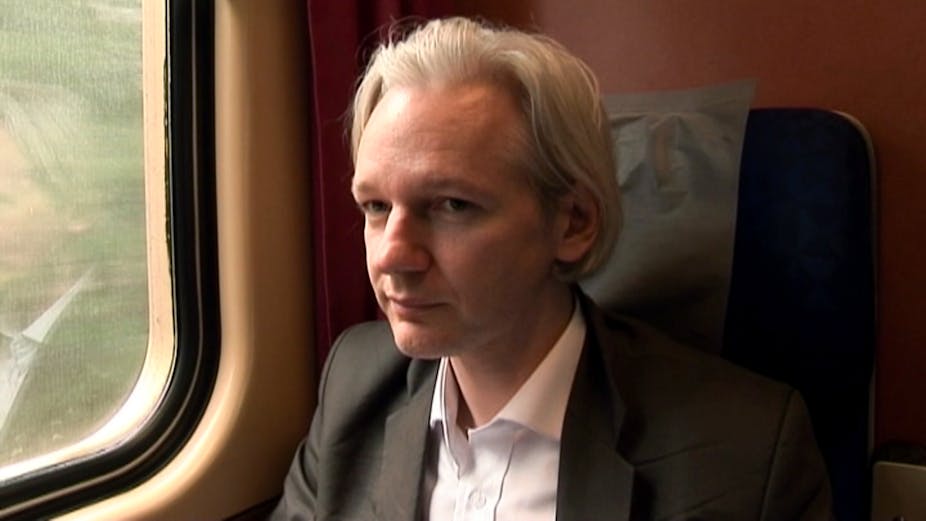Bradley Manning’s conviction for espionage marks the closing stages in the US Army private’s personal battle. Yet for Julian Assange, founder of whistleblower website WikiLeaks and Australian Senate candidate, Manning is but a casualty in a much grander mission.
WikiLeaks seeks to end the power of governments to judge when national security decisions should be closed to public scrutiny. Yet Assange’s vision for upholding “democratic freedoms”, if pursued to its logical conclusion, will itself threaten those very principles.
Manning was acquitted of more serious and contentious charges of aiding the enemy, but convicted on 20 further counts, including espionage. These carry a maximum sentence of 136 years, although that figure will likely be far less. The conduct of the trial has an immediate significance for Assange in what it signifies about his own fate, but it is more important in what it reveals for the future of the US government’s ability to control transparency in national security.
The factual basis for Manning’s conviction strengthens the case for indicting Assange under the 1917 Espionage Act. The US government must show that he gathered, transmitted or received classified defence information, and that he did so with the intent or reason to believe that it could potentially damage national security. The prosecutor reinforced these elements by repeatedly suggesting that Assange coached Manning to provide leaked documents for the purpose of hampering US national defence.
The basis for prosecution had already been made clear in a 2010 State Department letter warning that publishing leaked documents risked lives, US military operations and foreign relations. This makes it harder for Assange to deny the requisite element of intent. Assange will evade extradition for as long as he remains in diplomatic limbo in the Ecuadorian Embassy in London to avoid sexual assault charges in Sweden. But he can be confident that there is an arguable legal case and strong political will to make him accountable for his actions in a US court.
The government’s determination behind these prosecutions, and that of National Security Agency leaker Edward Snowden, raises the more fundamental question of what principles should guide the treatment of these men under US law. US president Barack Obama is repeatedly criticised by Assange and others for undertaking a “war on whistleblowers”, with strong and continuing civil society campaigns to free Manning. This is fundamentally a political question about what policy best promotes robust democratic government.
Assange clearly believes his own activism promotes the interests of democracy and political freedom. To this end he launched his Australian political party to achieve “accountability” rather than to govern: to serve as “an insurance against the election”. A recent Lowy Institute poll suggests he may have reason for optimism, with 58% of Australians approving of WikiLeaks. Yet Assange’s logic lays bare the threat posed to democracy when individuals usurp the prerogative of elected governments to determine both political processes and matters of national security.
The danger in the actions of Assange, Manning and Snowden is that they are each operating from within institutions established in a democratic society. However, from there, they have proceeded to make unilateral decisions about the most fundamental matters of government, without any of the obligation and democratic control that comes with legitimate political authority.
There is a real debate to be had about the proper balance between freedom of information and classified government operations. Former assistant secretary of state Philip Crowley, who resigned over his criticism of inhumane conditions of Manning’s imprisonment, nevertheless emphasised that: “finding the right balance among security, secrecy, transparency and privacy remains a work in progress”.
But the assumption underlying Assange’s mission is that hard balancing acts can be avoided, and instead national governments should be stripped of the capacity to make judgements about when it is necessary to engage in covert acts in the public interest. The reality is that for citizens to enjoy the umbrella of an effective national security system the government must necessarily take some actions outside of direct public scrutiny.
The US government may have struck the wrong balance in domestic surveillance programs revealed by Snowden, but it was clear that the electorate demanded a greater sense of security in the decade following the September 11 attacks. Political freedoms necessarily exist within a security framework forged by difficult decisions about where the power of the state will most effectively empower individuals.
The answer for citizens wanting to debate that balance is to fully engage in the democratic process, not only when that involves popular campaigns to support martyrs to high ideals, but continually partaking in the hard and sometimes ugly decisions about proper limits of free expression. Assange’s statement on the Manning verdict asserted that the leaking of documents created no victim other than “the US government’s wounded pride”. But the real victim may very well become freedoms and security enjoyed by the many.

